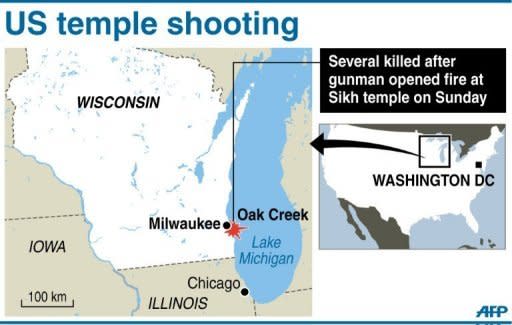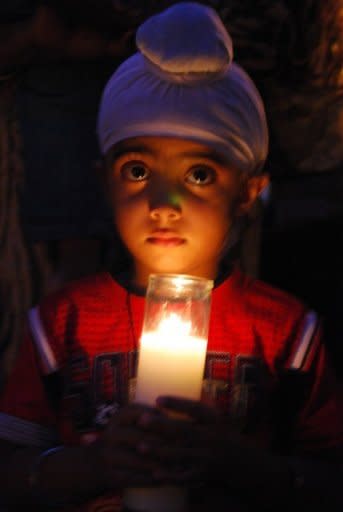US suburb mourns Sikh temple killings
A small US community struggled to understand Tuesday how a racist former soldier with links to white supremacists acted on his hatred and shot dead six unarmed people at a suburban Sikh temple. Wade Michael Page, 40, burst into the temple with a 9mm handgun and several clips of ammunition -- all purchased legally -- and opened fire on worshippers attending a service in Oak Creek, near Milwaukee, Wisconsin, on Sunday. With the town reeling from the slaughter of innocent citizens, teddy bears and flowers surrounded a makeshift memorial of six wreaths mounted on white stakes with the names and ages of each of the shooter's victims at the temple. Peggy Renner-Howell, 52, stood with her head bowed and her face clenched in sadness after laying white flowers at the foot of each wreath. "I'm totally devastated by what happened here," she said. "I'm just hoping and praying the victims and the families of the victims can find some peace." The temple shooting came just two weeks after 12 people were gunned down at a screening of the new Batman movie "The Dark Knight Rises," sparking debate about US gun laws, though politicians seem loathe to act in an election year. More details emerged Tuesday about Page, who was killed at the scene during a shootout with police. The gunman, who had become a singer in a so-called "white power" band, seems to have drifted from job to job since leaving the army in 1998 and local media reported that he described non-whites as "dirt people." A former army colleague recalled that Page had spoken of securing a homeland for whites. "It didn't matter if they were black, Indian, Native American, Latin -- he hated them all," Fred Allen Lucas, who served with Page at Fort Bragg military garrison, told the Milwaukee-Wisconsin Journal Sentinel. "He criticized me for my attraction to (Latina) women," said Lucas, of Bloomington, Indiana. "He'd call me a 'race-traitor.' He said I should change my ways because I was a blond-haired, blue-eyed white guy, and I shouldn't be wasting myself." Page served as a US military "psychological operations specialist" between April 1992 and October 1998, ending his career at the base at Fort Bragg, North Carolina, home to the US Army's airborne forces and Special Operations Command. He was a qualified parachutist who received several good conduct awards and a National Defense Service Medal, but never won significant promotion. The FBI, which did not have an active file on Page before the killings, have since said he is the subject of a "domestic terrorism" probe and his ties to white supremacist groups are being scrutinized. The Indian-American community held a candlelight vigil late Monday at a temple not far from the scene of Sunday's carnage. "We need this," Harsimran Kaur, 30, said of the service. "It's been chaos. We have suffered so much." The Southern Poverty Law Center, a civil rights group, on Monday branded Page a "frustrated neo-Nazi," and the SITE Intelligence Group said he was an active skinhead. A former army comrade, Christopher Robillard, told CNN that Page had spoken of "racial holy war, like he wanted it to come," but added that he never thought the suspected gunman would act on his rhetoric. Page was a member of the Hammerskins Nation, a white power group, and he "engaged in extensive online activity" and maintained user accounts on "some of the most prominent white supremacist forums," SITE said. The Southern Poverty Law Center said the ex-soldier had recently been the leader of the three-man hardcore punk band "End Apathy." Photographs of the band on its Myspace webpage (myspace.com/endapathyband) showed Page with a shaved head and Gothic tattoos all over his body. Band members were shown performing in front of extremist flags, including one bearing a Nazi swastika.






